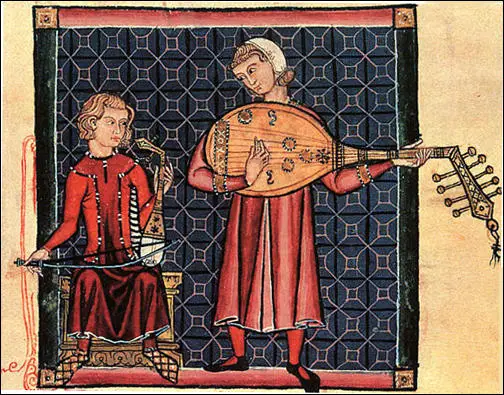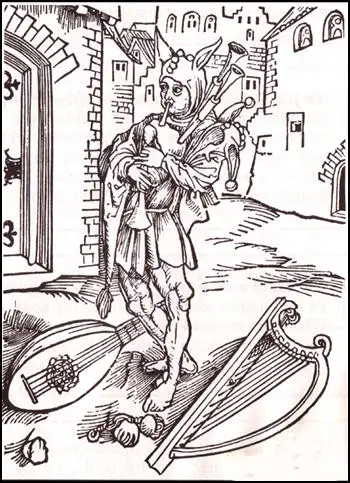Wandering Minstrels
Wealthy people in the Middle Ages employed minstrels to entertain them in their homes. Minstrels told stories, recited poems, sang ballads and played musical instruments. They were usually well paid. For example, in 1322 Agnes the Redhead received 4 shillings from Edward II for just one performance.
There were also wandering minstrels who spent their time travelling round the country. They performed in taverns, market-places or any other place they could find an audience who were willing to pay them.
The ballads sung by the wandering minstrels were different from those performed by the minstrels employed by the lords. These ballads were sung in English instead of Latin and French. Employing simple rhymes, these ballads told stories that were of interest to ordinary people.

Ballads often dealt with the problems of the poor. For example, The Song of the Husbandman tells the story of a farmer who has to sell his agricultural equipment and the seed for next season's crops in order to pay his taxes. "To find money for the king I sold my seed. Wherefore my land lies fallow and learns to sleep. They fetched the fair cattle from my fold, and when I think of my welfare I nearly weep! Thus many bold beggars are born... People are in such a plight that they can give no more. I suspect that if they had a leader, they would revolt."
Ballads sung by minstrels often dealt with rebellion. The most popular character in these ballads was Robin Hood. Honest men who had been forced to become outlaws by cruel government officials or corrupt members of the clergy, were a common theme in these ballads. The peasants in the Middle Ages particularly seemed to like ballads that told of outlaws who stole from the rich to give to the poor.
Minstrels not only entertained people with their ballads. They were also a source of news. As villeins were not allowed to leave the village, they relied on minstrels to bring them information about what was going on in the rest of the country.

The king and his nobles considered wandering minstrels to be dangerous people. Some religious leaders, such as Thomas de Cobham, Bishop of Worcester, called for these wandering minstrels to be arrested: "There are actors who have musical instruments for men's delight. Some haunt public drinking houses and other assemblies, where they sing many songs to move men to mischievous behaviour... But there are others who sing about the lives of princes".
In 1402 a law was passed against wandering minstrels in Wales who were accused of encouraging support for the revolt of Owain Glyndŵr. Another law was passed in 1469 which said that all minstrels would have to be checked by the king's royal minstrels before being given permission to perform in front of an audience. However, these laws were impossible to enforce and wandering minstrels continued to be active throughout the Middle Ages.
Primary Sources
(1) William Langland, The Vision of Piers Plowman (c. 1365)
I can not perfectly say the Lord's Prayer as the priest sings it.
But I know rhymes of Robin Hood and Randolph, earl of Chester.
(2) David Stephens, History Today (8th August, 1989)
(Wandering minstrels) were the journalists of their day, keeping the people informed of ideas and events from beyond the borders of their limited acres... They traded in pleasure, in hard news and gossip, in the latest fashions, in poetry, song and dance - they were the voice of change.
(3) John Major, The History of Greater Britain (1521)
At this time (the reign of Richard the Lionheart) there flourished the most famous robbers Robin Hood and Little John, who lay in wait in the woods, and robbed those that were wealthy... The feats of Robin are told in song all over Britain. He would allow no woman to suffer injustice, nor would he rob the poor, but rather enriched them from the plunder taken from abbots.
(4) The Husbandman Song (c. 1360)
I heard men upon earth moaning greatly about being vexed in their husbandry. Good years and grain are both gone, and no sayings are kept or songs sung. Now we must work; there is no other way, but I can no longer live on my gleanings. Yet there is a more bitter demand, for the fourth penny must go to the king. We complain bitterly to the king and hope to recover but are always cast down. Those who have any goods have no hope of holding them; we always lose the dearest at the last...
The rich rob without any right, and their lands and people lie lean, harmed through the bidding of bailiffs. Many men of religion hold baron and bondman, clerk and knight in contempt. Thus will walks in the land and the mind is amazed that falsity grows fat and strong, causing much harm....
To find money for the king I sold my seed. Wherefore my land lies fallow and learns to sleep. They fetched the fair cattle from my fold, and when I think of my welfare I nearly weep! Thus many bold beggars are born... People are in such a plight that they can give no more. I suspect that if they had a leader, they would revolt.
(5) A Gest of Robin Hood (c. 1495)
Christ have mercy on his soul... for he was a good outlaw, and did poor men much good.
(5) Thomas de Cobham, Bishop of Worcester (c. 1325)
There are actors who have musical instruments for men's delight. Some haunt public drinking houses and other assemblies, where they sing many songs to move men to mischievous behaviour... But there are others who sing about the lives of princes.
(5) Law passed by Edward IV in 1469.
No minstrel of our kingdom, although he may be sufficiently learned in his art or occupation, shall in any way exercise this art or occupation within our kingdom henceforth unless he be a member of the guild.
Student Activities
Wandering Minstrels in the Middle Ages (Answer Commentary)
The Growth of Female Literacy in the Middle Ages (Answer Commentary)
Women and Medieval Work (Answer Commentary)
The Medieval Village Economy (Answer Commentary)
Women and Medieval Farming (Answer Commentary)
Contemporary Accounts of the Black Death (Answer Commentary)
Disease in the 14th Century (Answer Commentary)
King Harold II and Stamford Bridge (Answer Commentary)
The Battle of Hastings (Answer Commentary)
William the Conqueror (Answer Commentary)
The Feudal System (Answer Commentary)
The Domesday Survey (Answer Commentary)
Thomas Becket and Henry II (Answer Commentary)
Why was Thomas Becket Murdered? (Answer Commentary)
Illuminated Manuscripts in the Middle Ages (Answer Commentary)
